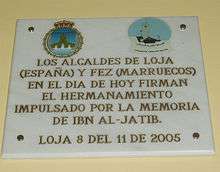Ibn al-Khatib
Lisan ad-Din ibn al-Khatib (Born 16 November 1313, Loja– died 1374, Fes, Morocco) (Full name Muhammad ibn Abd Allah ibn Said ibn Ali ibn Ahmad al-Salmani) was a Moroccan Arab[1] polymath[2] poet, writer, historian, philosopher, physician and politician from Emirate of Granada.[3] Some of his poems decorate the walls of the Alhambra in Granada.

He was born at Loja, near Granada. al-Khatib spent most of his life as vizir at the court of Muhammed V, but was exiled from Granada twice and lived for some time in the Marinid empire in Morocco (the first time 1360-62 and the second time 1371-74 in Ceuta and Tlemcen and Fes). In 1374, he was imprisoned and accused of heresy (Zandaqa) and atheism for which he was sentenced to death by suffocation. Earlier and modern historians assume that he was executed as a result of his many political feuds in Granada. His body was burned then buried at "Bab Mahruq", one of the gates of the city of Fes. His private feuds with the Nasrid Kings of Granada were the main reason of this treatment.[4]
He excelled as a historian and he wrote excellent poetry some of which was put to music as muwashshahat.
His autobiography, written in 1369, is to be found in part of his al-Ihata fi akhbar Gharnata (The Complete Source on the History of Granada) ed. Muhammad Abd Allah Inan (Cairo: Maktabat al-Khanji, 1978). This work has yet to be translated into English.
On the Plague
Ca. 753AH (1362AD) Ibn al-Khatib wrote a treatise on the plague (Muqni'at al-sā'il 'an al-maraḍ al-hā'il). The original Arabic text is preserved in the Biblioteca del Real Monasterio de El Escorial, MS Arabic 1785. [5] Ibn al-Khatib is thought to have developed the idea of contagion -- i.e. that disease is spread from one person to another by close contact -- long before European Louis Pasteur. The Black Death bubonic plague reached al-Andalus in the 14th century. All told it is estimated to have killed as much as one third of the population of the Muslim world.[6]
Ibn al-Khatib wrote a treatise called On the Plague, in which he stated:[7]
`The existence of contagion is established by experience [and] by trustworthy reports on transmission by garments, vessels, ear-rings; by the spread of it by persons from one house, by infection of a healthy sea-port by an arrival from an infected land [and] by the immunity of isolated individuals.`
While the plague hadith indicated that the Prophet suggested otherwise,
`a proof taken from the traditions has to undergo modification when in manifest contradiction with the evidence of the perception of the senses.`"[6][8][9]
However some (Sadakat Kadri) believe this may have led to his execution by strangulation for "heresy".[6]
Bibliography
- Jaysh Al-Tawshih of Lisan Al-Din Ibn Al-Khatib (Arabic), An Anthology of Andalusian Arabic Muwashshahat, Alan Jones (Editor), 1997 - ISBN 978-0-906094-42-6
- Lisan Al Din Ibn Al Khatib, Tarikh Isbaniya Al Islamiya (history of Muslim Spain), ed. by Levi-Provencal, new edition, Cairo, 2004
- Lisan Al Din Ibn Al Khatib, Awsaf Al Nas (description of peoples), Cairo, 2002
- Lisan Al Din Ibn Al Khatib, Khaṭrat al-ṭayf : riḥlāt fī al-Maghrib wa-al-Andalus, 1347–1362, 2003
- Lisan Al Din Ibn Al Khatib, Nafadhat al-jirab (the Ashtray of the Socks)
- Lisan al-Din ibn al-Khatib homme de lettres et historien, by Abdelbaqui Benjamaa, (French) thesis, Universite de la Sorbonne Nouvelle Paris III, 1992 (microform).
See also
References
- ↑ Farhad Daftary, The Assassin Legends: Myths of the Isma'ilis, (I.B.Tauris, 1994), 160.
- ↑ Alexander Knysh, Ibn 'Arabi in the Later Islamic Tradition, SUNY Press (1999), p. 172
- ↑ Encyclopedia of Medieval Iberia, ed. Michael Gerli. (New York: Routledge, 2003), 416–417
- ↑ Awasaf an-Nas fi Tawarikh wa Silat, pp19, Mohamed Kamal Chabana
- ↑ M. W. Dols, The black death in the Middle East, New Jersey, 1977, 322. M. Aguiar Aguilar, "Aproximación al léxico árabe medieval de la epidemia y de la peste", Medicina e Historia (2014) http://issuu.com/fundacionuriach/docs/m_h_2_2014_v7_r
- 1 2 3 Kadri, Sadakat (2012). Heaven on Earth: A Journey Through Shari'a Law from the Deserts of Ancient Arabia ... macmillan. p. 185. ISBN 9780099523277.
- ↑ Byrne, Joseph P. Encyclopedia of the Black Death. ABC-CLIO. p. 182. ISBN 1598842536.
- ↑ quote from Arnold, Thomas W. and A. Guillaume, Legacy of Islam, Oxford, 1931, p.340
- ↑ c.f. Ober, William B., and Nabil Alloush, "Plague at Granada, 1348-1349: Ibn al-Khatib and Ideas of Contagion." Bulletin of the New York Academy of Medicine, v.58, n.4 (1982), pp.422
External links
| Arabic Wikisource has original text related to this article: |
- Poem by Ibn al-Khatib sung by Fairuz (click on the oval above the poem)
- Ibn al-Jatib (second part of the page is in English)
- Website Ibn Kahldun: Ibn al-Khatib, retrieved on feb. 2, 2008
- Encyclopedia of medieval Iberia, Ibn al-Khatib, retrieved on feb. 2, 2008
- Ibn al-Khatib. Polymath Virtual Library, Fundación Ignacio Larramendi